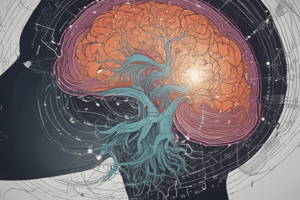Podcast
Questions and Answers
What is the first step in problem-solving strategies?
What is the first step in problem-solving strategies?
- Review and Reflect
- Gather Information
- Choose a Solution
- Define the Problem (correct)
Which of the following best describes inductive reasoning?
Which of the following best describes inductive reasoning?
- Deriving specific conclusions from general principles.
- Drawing general conclusions from specific observations. (correct)
- Assessing credibility and relevance of information.
- Using structured thinking to make inferences.
What characterizes sound reasoning in logical reasoning?
What characterizes sound reasoning in logical reasoning?
- It is based solely on contrary evidence.
- It lacks any structured argumentation.
- The argument is valid and all premises are true. (correct)
- All premises lead to false conclusions.
In deductive reasoning, what is the role of the general premise?
In deductive reasoning, what is the role of the general premise?
Which core component of critical thinking involves breaking down information into understandable parts?
Which core component of critical thinking involves breaking down information into understandable parts?
What is the main purpose of evaluating options in problem-solving?
What is the main purpose of evaluating options in problem-solving?
Which of the following statements reflects the nature of critical thinking?
Which of the following statements reflects the nature of critical thinking?
What does valid reasoning ensure in logical argumentation?
What does valid reasoning ensure in logical argumentation?
Study Notes
Problem-solving Strategies
- Define the Problem: Clearly identify what needs to be resolved.
- Gather Information: Collect relevant data and insights regarding the problem.
- Generate Options: Brainstorm multiple potential solutions.
- Evaluate Options: Assess the pros and cons of each option.
- Choose a Solution: Select the most viable option based on evaluation.
- Implement the Solution: Put the chosen solution into action.
- Review and Reflect: Analyze the outcome to understand its effectiveness and learn from the process.
Inductive Reasoning
- Definition: Drawing general conclusions from specific observations or instances.
- Characteristics:
- Moves from specific to general.
- Involves likelihood rather than certainty.
- Useful for forming hypotheses and theories.
- Example: Noticing that a specific species of birds migrate south for the winter and concluding all birds of that species do the same.
Logical Reasoning
- Definition: The process of using structured thinking to make inferences, conclusions, or judgments.
- Types:
- Valid Reasoning: Structures argument so that if premises are true, the conclusion must be true.
- Sound Reasoning: Valid arguments with true premises.
- Importance: Essential for coherent argumentation, problem-solving, and decision making.
Deductive Reasoning
- Definition: Deriving specific conclusions from general principles or premises.
- Structure:
- Starts with a general statement (premise).
- Applies this to specific cases.
- Concludes with a specific assertion.
- Example: All humans are mortal (general premise), Socrates is a human (specific case), therefore Socrates is mortal (conclusion).
Critical Thinking
- Definition: The ability to analyze facts to form a judgment.
- Core Components:
- Analysis: Breaking down information into parts to understand it better.
- Evaluation: Assessing credibility, relevance, and significance.
- Inference: Drawing logical conclusions from available information.
- Explanation: Clearly articulating reasoning processes.
- Importance: Enhances decision-making, problem-solving, and understanding complex issues.
Problem-solving Strategies
- A systematic approach to tackling challenges
- Involves clearly defining, gathering information, generating options, evaluating, implementing, and reviewing the chosen solution.
Inductive Reasoning
- A method of reasoning that moves from specific observations to general conclusions.
- Based on probability rather than certainty.
- Helpful for forming hypotheses and theories based on patterns or trends.
- Example: observing that swans are white, and concluding (incorrectly) that all swans are white.
Logical Reasoning
- The process of using structured thinking to draw inferences, conclusions, or judgments.
- Valid reasoning ensures the conclusion is true if the premises are true.
- Sound reasoning adds the requirement of true premises to valid reasoning.
- Essential for clear argumentation, problem-solving, and decision-making.
Deductive Reasoning
- A method of reasoning that starts with a general principle and applies it to specific cases.
- Uses a general statement (premise) to arrive at a specific conclusion based on that statement.
- Example: All humans are mortal, Socrates is a human, therefore Socrates is mortal.
Critical Thinking
- The ability to analyze facts and form a judgment.
- Involves analyzing, evaluating, inferring, and explaining.
- Enhances decision-making, problem-solving, and comprehension of complex issues.
Studying That Suits You
Use AI to generate personalized quizzes and flashcards to suit your learning preferences.
Description
This quiz will test your understanding of various problem-solving strategies and reasoning techniques, including inductive and logical reasoning. Explore the steps involved in effective problem resolution and the principles of drawing conclusions from observations. Improve your critical thinking skills through practical examples.




